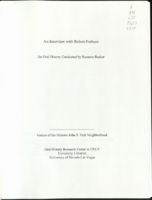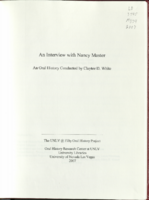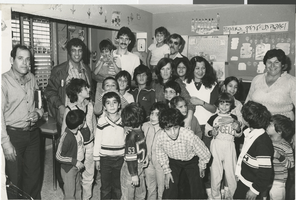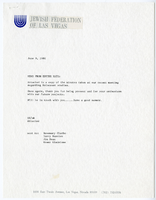Search the Special Collections and Archives Portal
Search Results

Mason Family, image 07, 1969
Description
Jim Mason's Preschool graduation at Temple Beth Sholom (located on Oakey) with teacher, Miss Berry.
Alma Vining oral history interview
Identifier
Abstract
Oral history interview with Alma Vining conducted by Christine Carrera on April 10, 2006 for the Public School Principalship Oral History Project. In this interview, Vining reflects upon her 30-year career as an elementary school teacher and administrator with Nevada’s Clark County School District (CCSD) from the 1970s to the 2000s. She describes the process by which she became an administrator, her regular responsibilities, and challenges that she faced. She also discusses school district programs such as No Child Left Behind, bilingual education, and school integration.
Archival Collection
Connie Hill Sheldon oral history interview
Identifier
Abstract
Oral history interview with Connie Hill Sheldon conducted by Claytee D. White on February 11, 2013 for the Boyer Early Las Vegas Oral History Project. Sheldon talks about military life in New York City, New York, her driving a school bus in Havelock, North Carolina, being a preschool teacher in Mission Viejo, California, and her jobs at the Huntridge Theater, the Nevada Test Site, and at Reynolds Electrical and Engineering Company, Inc.
Archival Collection

Transcript of interview with Robert Forbuss by Suzanne Becker, February 12, 2009
Date
Archival Collection
Description
In 1944, Robert Forbuss' mother bought a home in a new tract development called Huntridge, adjacent to the John S. Park Neighborhood. She was a single woman who had managed to put together the down payment from her earnings as a cocktail waitress. A couple years later John S. Park Elementary School was built nearby. Through any ups and downs, Marjorie Forbuss refused to live anywhere else for the rest of life, even when Robert encouraged her to move. For this interview, Robert intersperse Las Vegas history while sharing childhood memories of the neighborhood. He graduated from Bishop Gorman High School, the private Catholic prep school, in the mid-1960s. A few years later, Robert returned there as a teacher from 1973 - 1981, teaching kids with familiar last names in the neighborhood he had grown up in. During that time he lived in the John S. Park Neighborhood. He details the charm of the neighborhood, cruising the Downtown area, shopping on Fremont Street and much more. When Robert left teaching, he became the general manger of Mercy Ambulance and Medical Supply, which he ultimately owned until about 2003. During this time, he was a successful business leader and an active community member.
Text
Norman Christiansen oral history interview
Identifier
Abstract
Oral history interview with Norman Christiansen conducted by James Courtney on November 28, 1986 for the Ralph Roske Oral History Project on Early Las Vegas. Christiansen describes his family, and background before moving to Las Vegas, Nevada in 1956 from Montana. Christiansen then talks about working at the Nevada Test Site and about his career as a teacher. He speaks about the various changes he has noticed over the years in Las Vegas, including those in climate, pollution, economy, occupation, and standard of living.
Archival Collection

Transcript of interview with Nancy Master by Claytee D. White, July 14, 2006
Date
Archival Collection
Description
Text
Craig F. Swallow oral history interview
Identifier
Abstract
Oral history interview with Craig F. Swallow conducted by Christine E. Johnson on February 29, 1980 for the Ralph Roske Oral History Project on Early Las Vegas. In this interview, Swallow discusses his personal history growing up in Boulder City, Nevada. Swallow describes life in Boulder City, his education, and important figures in the city. Swallow also discusses his time in the U.S. Army before eventually moving to Las Vegas, Nevada to start his career as a teacher. He goes on to talk about the school system in Las Vegas, how Boulder City has changed, the effects of the Mormon church on education, and race relations.
Archival Collection

Photograph of children in a classroom, 1980s
Date
Archival Collection
Description
Black and white photograph with children and teachers in a classroom.
Image

Holocaust Education Committee letters and meeting minutes, document 11
Description
Memo from Edythe Katz on June 09, 1980 and minutes from the Holocaust Education Meeting on June 4, 1980.
Mabel Hoggard Papers
Identifier
Abstract
The Mabel Hoggard Papers (1903-2011) contain materials related to Hoggard's career as a Las Vegas, Nevada elementary school teacher, her research and civic interests in Las Vegas's predominantly African American Westside communities, and her engagement with civil rights issues. The collection also contains materials about Hoggard's life, including biographical newspaper articles about her childhood, education, work, and family. The collection includes lesson plans, scrapbooks, awards, correspondence, photographs, and physical objects such as a vinyl record and political pins. The bulk of the collection focuses on her life in Las Vegas from approximately 1946-1989.
Archival Collection
